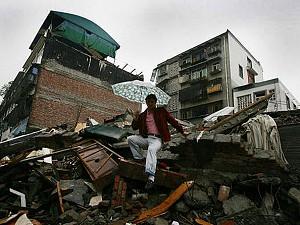As the death toll continues to climb in the wake of the 7.9 magnitude earthquake that rocked China’s Sichuan province Monday, evidence has surfaced suggesting that Chinese officials were warned of the quake days earlier, yet suppressed the news.
China’s deadliest quake in 30 years struck on the afternoon of May 12th in Wenchuan county, Sichuan province, and could be felt as far away as Vietnam and Beijing. While earthquake prediction is a developing science, China has some of the best earthquake research labs in the world. The benefits of that knowledge, however, may have been ignored if reports coming out of China are true.
As of Wednesday, the official death toll had nearly reached 15,000. Tens of thousands of troops, firefighters and civilians were working to save more than 25,000 people buried under collapsed schools, factories and hospitals.
Officials are warning of dangers from increased strain on local dams as well as mudslides on brittle hillsides where rain has been forecast over the next few days.
Authorities said the dams of two hydropower stations in Maoxian county, where 7,000 residents and tourists remain stranded near the epicenter, were “seriously damaged,” and could burst.
Landslides had blocked the flow of two rivers in northern Qingchuan county, forming a huge lake in a region where 1,000 have already died and 700 are buried, China’s state media reported.
The quake had also stopped a river in the stricken Mianzhu region, prompting officials to evacuate residents and drain dams downstream, the agency said.
Amidst the disaster is a growing chorus of bloggers and Chinese citizens saying authorities had ignored warnings of the quake days prior to it striking.
On May 7th, five days before the deadly quake struck, a self-proclaimed seismologist from Wuhan city posted a notice on the Internet predicting that an earthquake would strike on May 12th.
“According to information I have in hand, and exchanges that I have had with some foreign colleagues, I predict China will have an earthquake on May 12, 2008. The approximate location will be in the middle of Sichuan and Hubei, though all China may feel the tremors,” read the notice.
The man went on to note that his predictions could not be announced publicly because it could cause “panic.”
Epoch Times is still trying to confirm the name and claims of this seismologist.
This notice appeared on the Sichuan government website two days before the catastrophic earthquake. It said the rumours of an upcoming earthquake were false and had been quelled. The notice was deleted after the quake hit Tuesday.
Even before the notice was posted though rumors were spreading in Sichuan province of a potential earthquake. Sichuan residents apparently made calls to the local Earthquake Preparedness and Disaster Reduction office of the Provincial Seismological Bureau to verify whether or not the rumors were true.
The bureau denied the possibility of a quake, and on May 9th, a notice was published on the local government Web site that dismissed the earthquake rumors. The notice read in part:
“On May 3, the Earthquake Preparedness and Disaster Reduction of the Seismological Bureau of Ahazhou received calls to inquire whether the rumors were true that Suomo Town, Maerkong County [Sichuan province] was going to have a major earthquake and that village officials advised villagers to stay outdoors.
“After receiving the calls, the Bureau immediately asked the Earthquake Preparedness and Disaster Reduction of the Seismological Bureau of Maerkong County to investigate the source of the rumor, to dispel it, to widely explain the actual situation, and to prevent the rumor from spreading further.”
Three days later, after the earthquake struck, the notice was deleted. A screenshot of the notice can be seen on the Epoch Times Web site.
Some Chinese netizens have begun openly speculating that the regime deliberately concealed news of the earthquake in spite of evidence.
“Even when there were already signs indicating an earthquake, the Sichuan Seismological Bureau still suppressed and failed to report the information, completely disregarding people’s lives,” wrote one Internet user who claimed to have a relative working in the Provincial Seismological Bureau.
“My uncle called me some time ago and told me about the earthquake warning signs, but the Bureau didn’t allow them to release the information and stressed the need to ensure stability before the Olympics.”
But in China, where access to information is strictly controlled by the ruling Chinese Communist Party, it can be difficult for citizens to distinguish fact from the rumours the grow to fill the information vacuum.
In a recent article, The Times Online described the speculation of Chinese netizens that the earthquake warnings were suppressed as “quake conspiracies” cooked up by bloggers looking for a scapegoat.
The article also described Chinese media reports of bizarre animal migrations days prior to the quake. In China, unusual animal behaviour is a traditional form of earthquake prediction that is now coupled with western-style seismic research. To date, seismic science is not able to predict earthquakes with guaranteed accuracy.
Memories of Tangshan
The earthquake in Sichuan is the deadliest to strike China since July, 1976, when a massive earthquake levelled the city of Tangshan, killing anywhere from 242,419 to upwards of 655,000 people.
Then, too, scientists had seen warning signs of an impending earthquake. Among them was Yang Youchen, a seismologist who says he made predictions of the earthquake in early 1976. Yang said he had predicted that a large earthquake would strike Tangshan in July or August of that year.
In May, just months before the earthquake, he presented his data to a conference organized by the China Earthquake Association, which failed to take seriously his warnings. He said he also spoke with the Tangshan Communist Party Secretary about the potential for an earthquake, but the city’s deputy mayor ruled that it was too early to put the city on alert. Soon thereafter, Yang was sent to a reeducation class to reform his thinking.
Another geologist, Ma Xirong, alerted the China Earthquake Association (CEA) just weeks before the quake of strange fluctuations he'd noticed in the earth’s electrical resistance readers. He similarly warned that a catastrophic earthquake could be on the way, but CEA officials dismissed his findings.
In light of repeated warnings from geological monitoring centers, some officials did take note, risking their political careers to help prepare people for an earthquake.
Wang Chengmin, a CEA expert, circulated warnings of an imminent earthquake near Tangshan and spoke with a small group of officials from surrounding areas about his concerns. One of them, Wang Chunqing, brought news back to the nearby county of Qinglong, where citizens were warned of the coming disaster. These efforts, by some estimates, may have saved as many as 400,000 lives.
Following the earthquake in Tangshan, China’s leaders refused to acknowledge the scale of the disaster or accept international relief efforts, determined to preserve an image of China as a communist utopia.
Files contributed by Reuters


